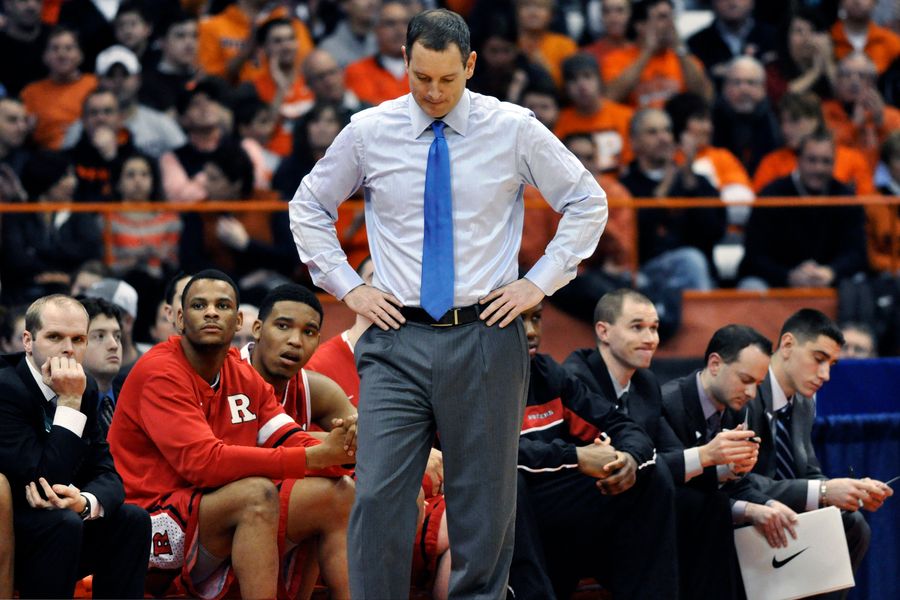Why Not Prosecute Mike Rice?

Eric Murdock's wrongful termination suit against Rutgers, filed yesterday, alleges his firing came as a "direct result of Mr. Murdock's complaints and report of Defendant Rice's unlawful conduct." Murdock's lawyers aren't the first to allude to Rice's iffy legal standing: On Wednesday, a columnist for the Daily News wrote a piece titled, "Does Mike Rice belong in jail for his behavior as Rutgers basketball coach?" Notwithstanding the hallowed rule that any article headlined by an interrogative will ultimately answer, "no," this column argues that Rice's conduct would be viewed far differently were he, say, a chemistry professor, and ultimately says yes: "Under New Jersey law there seems to be little doubt that Rice violated criminal statutes." While it's not obvious how the case would be settled, Rice was likely videotaped in the process of violating the law.
New Jersey has a law against "simple assault" (as opposed to aggravated assault). Mike Rice was probably guilty of it when he shoved his players and threw basketballs at them, as seen in the Outside The Lines video of his practices at Rutgers. It's a "Disorderly Persons offense," as opposed to a "crime." Disorderly Persons offenses are still punishable by six months in jail or fines up to $1,000, neither of which seem outlandishly punitive considering Rice's apparently long history of being an asshole, and the demonstrable need to make it clear to public employees that they aren't to push, threaten or belittle college students.
A bill introduced on May 3, 2012 into the New Jersey State Legislature defines simple assault:
a. Simple assault. A person is guilty of assault if he:
(1) Attempts to cause or purposely, knowingly or recklessly causes bodily injury to another; or (2) Negligently causes bodily injury to another with a deadly weapon; or (3) Attempts by physical menace to put another in fear of imminent serious bodily injury. Simple assault is a disorderly persons offense unless committed in a fight or scuffle entered into by mutual consent, in which case it is a petty disorderly persons offense.
(A defense lawyer might claim that volunteering to play D-I basketball is sort of a scuffle entered by mutual consent—wouldn't that be an interesting precedent—but it's tough to imagine a jury buying anything so abstract after watching the tape.) In the video, there are numerous instances of shoving and throwing basketballs, but one moment in particular, highlighted by Don Van Natta Jr., seems germane:
On a 30-minute video Murdock said he showed Pernetti and other Rutgers officials in December, Rice is seen hurling a ball from point-blank range just passed Biruta's head, shoving him and repeatedly swearing at him. At another point, Rice hurls a ball that strikes Biruta's knee. He appears momentarily hurt and has to sit out a play.
Not earth-shattering, but the bar is pretty low for a simple assault charge, and it sounds like Biruta was hurt. Moreover, Rice's behavior seems to fit the bill for (3), attempting to intimidate by physical menace, even more clearly. Murdock's testimony, given to Pernetti and related to Outside the Lines, that there "were some players who couldn't sleep at night, who wasn't eating, who didn't want to come to the gym," seems to support a charge of instilling fear by physical menace, though whether that fear was of serious bodily injury or just continually diminished self-esteem would be at issue.
A set of jury and sentencing guidelines for the charge of simple assault says a defendant can be convicted if a jury decides he inflicted "bodily pain," defined as "physical pain, illness or any impairment of the physical condition," "purposely or knowingly or recklessly." The definition of "recklessly" is given:
A person acts recklessly with respect to causing bodily injury when a person consciously disregards a substantial and unjustifiable risk that the material element exists or will result from his/her conduct. The risk must be of such a nature and degree that, considering the nature and purpose of the actor's conduct and the circumstances known to the actor its disregard involves a gross deviation from the standard of conduct that a reasonable person would observe in the actor's situation. One is said to act recklessly if one acts with recklessness, with scorn for the consequences, heedlessly, foolhardily.
Is shoving players around and throwing balls at their heads "a gross deviation from the standard of conduct that a reasonable person would observe" as the basketball coach of mid-tier public university in the Big East? Do reasonable people even take that job? It would be interesting to know what a court had to say, but at least some legislators—the people who passed the bills that contain these definitions—were happy to call for Rice's head. Assembleyman Reed Gusciora even suggested that the New Jersey state assembly defund Rice's salary in the event that he be retained.
If there's an obvious hitch, it's in the statute of limitations for simple assault: one year. Murdock showed Rutgers officials the tape in December, but it shows practices from 2010-2012. The clips of Gilvydas Biruta are from prior to this season, as he transferred to Rhode Island after the 2011-2012 campaign. If Rice is walking away simply because it's too late to do anything, Pernetti's silence, and indeed, Murdock's decision to wait until he was fired to come forward, look especially bad.
Oh, well. Hopefully future coaches understand that their freedom may be as much at stake as their reputation and salary if they choose to go the abusive route. As for Rice, he'll get his just desserts ...eventually.

